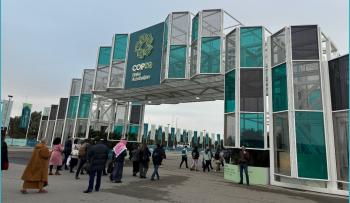
Henk Swarttouw: “Investing in cycling to save our planet is a no-brainer”
We cannot afford to wait decades for our fleet of fossil-fuel cars to be fully replaced by electric vehicles. To cut transport CO2 emissions quickly and on a massive scale, EU and world leaders must commit to boosting global cycling levels now.
World leaders and governments have gathered in Glasgow for COP26 to find a way forward on the most important global crisis of our times. On Monday 8 November, I arrived in Glasgow to join them. Let me tell you why.
I have cycled all my life. As a kid growing up in the Netherlands in the sixties, my parents sent me off cycling to school on a small bike every morning like most of my classmates. But in those years of rapid economic growth, our streets became increasingly unsafe for cyclists – especially the smaller ones. One morning, one of the kids was killed on the road to school by a car driver, and this tragedy set off a vicious circle of more and more parents choosing to drive their kids to school, increasing traffic on the roads, in turn leading to even fewer people cycling.
More than 50 years later, it has never been clearer that humanity needs to break this circle.
Our world today is on fire, and the way we move about it is a major part of the problem. Worldwide, transportation is responsible for 24% of direct CO2 emissions from fuel combustion. Road vehicles account for nearly three quarters of transport emissions and these numbers are not decreasing.
Global automobile sales continue to grow, with over 70 million units expected to be sold this year – the vast majority still with internal combustion engines – and the car industry is churning out ever-bigger vehicles, cancelling out the gains of more fuel-efficient motors. In 2019, the International Energy Agency found that SUVs were the second-largest cause of the global rise in CO2 emissions over the last decade.
Meanwhile, half of all car journeys in Europe are less than 5 kilometers long. In the United States, which is less densely populated, nearly 60% of car trips are less than 9.5 kilometers (6 miles). These are distances that most people can cover by bicycle – especially on an e-bike. Apart from fueling the climate crisis and polluting the air, our overuse of cars contributes to the more than 1 billion adults in the world who are not getting enough physical activity.
Re-enter the bicycle, a simple invention that has been around for almost two centuries and could prove crucial for our fight against the climate crisis.
New research shows that cyclists have 84% lower daily CO2 emissions than non-cyclists. In one year, the Dutch avoided 1.41 million tons of CO2 by taking the bicycle, the equivalent of a 950,000 diesel cars driving from Lisbon to Moscow and back. In cities, swapping the car for cycling even just one day a week can reduce a person’s yearly carbon footprint by about half a ton of CO2.
That is for one person, once a week. Now imagine thousands of people in one city swapping the car for a bicycle trip each week – and the impact it would have on that city’s emissions. Investing in cycling to save our planet is a no-brainer. It is what any sensible political leader should be doing right now.
We don’t need to look far afield for new tech to cut CO2 emissions from transport. The benefits that cycling offers today can be leveraged by radically scaling up its use. Humanity cannot afford to wait decades for our fleet of fossil-fuel cars to be fully replaced by electric vehicles, nor can we wait years for new cycling infrastructure to be rolled out. To quickly cut transport CO2 emissions on a massive scale, we need to invest in much more cycling now.
At COP26 in Glasgow, our leaders and governments should commit to drastically increase global cycling levels. One of the biggest factors keeping more people from cycling is concerns about road safety – like the parents at my school half a century ago – and that is exactly why governments need to provide the financing and legislation to build high-quality cycling infrastructure, integrate cycling with public transport and provide incentives for people and businesses to switch to cycling for their short trips.
Instead of COP26’s exclusive focus on zero-emission vehicles and car-charging infrastructure, active mobility should be a cornerstone of global, national and local transport strategies to meet net-zero carbon targets. It makes economic sense too: cycling investments are affordable and come with a return on investment of around 800%. More people riding bikes will help save our planet from catastrophic warming, relieve our public health systems from the onslaught of cardiovascular disease and stimulate our green economic recovery after the COVID-19 pandemic.
Like the one I rode to school over half a century ago, the bicycle is one of the best solutions we already have to save our planet. After my arrival in Glasgow by train, I rented a bicycle and made my way to the COP26 venue where I’ll be reminding our leaders that saving the world doesn’t require reinventing the wheel.
Henk Swarttouw is President of the European Cyclists’ Federation and the World Cycling Alliance.
Regions:
Contact the author
Recent news!
Upcoming events
Contact Us
Avenue des Arts, 7-8
Postal address: Rue de la Charité, 22
1210 Brussels, Belgium









